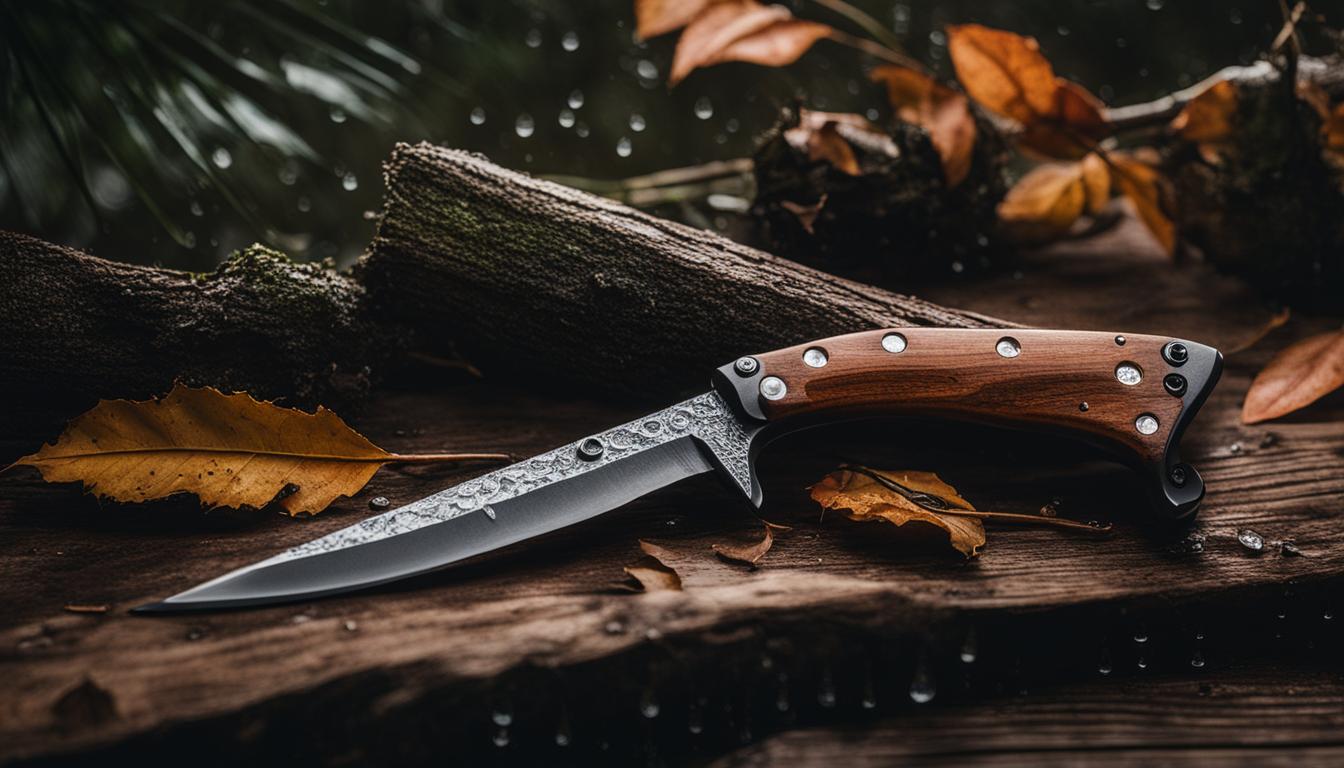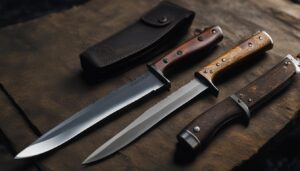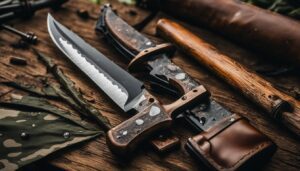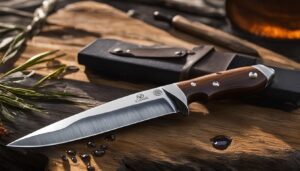As an avid hunter, I understand the importance of keeping hunting knives in top condition. One of the biggest challenges we face is rust. Rust can quickly deteriorate the blade and compromise its performance, making it essential to employ effective rust prevention measures.
In this article, I will share valuable insights and tips on how to prevent rust on your hunting knives. By following these essential rust prevention tips, you can ensure that your knives remain rust-free and ready for action on your next hunting adventure.
Key Takeaways:
- Steel knives, including high carbon and stainless steel, are susceptible to rust.
- Rust is caused by the reaction of iron in steel with oxygen and water.
- Montana Knife Company uses Parkerizing and Cerakote to protect their carbon steel blades from rust.
- Cleaning the blade with soapy water, applying blade wax, and keeping the sheath dry are effective rust prevention measures.
- Consistency is key in maintaining rust-free hunting knives.
Why Does Steel Rust and How Does the MKC Prevent It?
Steel, including carbon and stainless steel, naturally rusts when exposed to moisture and oxygen. Carbon steel knives have a higher carbon content and little to no chromium, making them more prone to rust. Stainless steel knives have a higher chromium content, protecting them longer from corrosion. However, stainless steel can still rust with abuse or lack of care. Montana Knife Company takes steps to prevent rust on their knives by using techniques like Parkerizing, a phosphate coating process that turns the metal black and protects it from rust. They also use Cerakote, a durable baked-on ceramic finish, to fight against rust.
Parkerizing is a crucial part of the rust prevention process used by Montana Knife Company. This process involves immersing the steel blades in a solution containing phosphoric acid and other chemicals. The phosphate coating that forms on the metal creates a blackened layer that acts as a protective barrier against rust and corrosion. This coating not only enhances the durability of the knife but also provides a visually appealing black finish.
In addition to Parkerizing, Montana Knife Company applies Cerakote to their knives. Cerakote is a state-of-the-art ceramic finish that is highly resistant to corrosion, chemicals, and wear. It is applied as a thin layer and baked onto the steel surface, creating a protective barrier that helps prevent rust. The Cerakote finish also provides a smooth and aesthetically pleasing coating that enhances the overall look of the knife.
Comparing Parkerizing and Cerakote:
| Property | Parkerizing | Cerakote |
|---|---|---|
| Rust Prevention | Effective | Highly Effective |
| Appearance | Blackened finish | Smooth and aesthetically pleasing |
| Durability | Resistant to wear | Highly resistant to corrosion, chemicals, and wear |
By combining the rust prevention techniques of Parkerizing and Cerakote, the Montana Knife Company ensures that their knives are well-protected against the damaging effects of rust. These processes not only preserve the functionality and longevity of the knives but also enhance their overall appearance. With proper care and maintenance, hunters can rely on their knives from Montana Knife Company to remain rust-free and ready for any outdoor adventure.
Essential Rust Prevention Tips for Hunting Knives
When it comes to hunting knives, taking proper care to prevent rust is essential for maintaining their longevity and performance. Here are some indispensable rust prevention tips to keep your hunting knife in optimal condition:
Cleaning the Blade
After each use, it is crucial to clean the blade thoroughly to remove any dirt, debris, or residue. Use warm soapy water and a soft brush to gently scrub the blade, ensuring all surfaces are clean. Pay special attention to any areas that may have come into contact with acidic substances, as these can accelerate rust formation. Once clean, dry the blade completely using a clean cloth to eliminate any moisture that could lead to rust.
Applying Blade Wax
Applying a protective layer of blade wax is an effective way to prevent rust on hunting knives. Choose a high-quality wax, like MKC blade wax made with natural materials, and apply a thin, even coat to the blade’s surface. This wax acts as a barrier, shielding the steel from moisture and air that can cause rust. Reapply the blade wax after each cleaning to maintain its protective properties.
Drying the Sheath
Properly drying the sheath is equally important in preventing rust on hunting knives. After each use, remove the knife from the sheath and thoroughly dry both the blade and the sheath. Moisture trapped inside the sheath can create a breeding ground for rust, so ensure it is completely dry before storing your knife. A good practice is to leave the sheath in a well-ventilated area until it is entirely moisture-free.
By following these essential rust prevention tips, you can ensure that your hunting knife remains in top condition, free from rust and ready for your next outdoor adventure.
Using Lubrication and Professional Care for Rust Prevention
When it comes to preventing rust on hunting knives, regular lubrication and professional care are essential. Properly lubricating the blade helps reduce friction, improve performance, and protect against rust. To lubricate your knife, apply a few drops of oil to the joints and springs of a pocket knife. For other blades, wipe the blade with an oil-moistened cloth. This simple step can go a long way in preventing rust, especially in hot and damp climates or near the ocean.
However, in certain situations where your knife comes into contact with saltwater or other corrosive substances, a basic lubrication may not be enough. In such cases, it’s crucial to take immediate action to prevent rust. Rinse the blade thoroughly with tap water to remove any trace of the corrosive substance. After drying the blade well, apply a light coat of oil to create a protective barrier against rust.
If you’re unsure of how to properly care for your knife or if you’ve encountered persistent rust issues, it’s recommended to seek professional knife maintenance services. A local bladesmith or knife specialist can provide expert care and restoration, ensuring that your knife receives the attention it needs to stay rust-free and in optimal condition.
| Benefits of Lubrication for Rust Prevention | Professional Knife Maintenance Services |
|---|---|
|
|
Remember, prevention is key
To keep your hunting knife in optimal condition and prevent rust from occurring, consistent maintenance is key. By incorporating regular lubrication and seeking professional care when needed, you can ensure that your knife remains rust-free and ready for use. Taking these proactive steps will not only extend the lifespan of your knife but also enhance its performance, allowing you to make the most out of your hunting experiences.
Taking Care of Your Knife’s Purpose and Storage
To ensure the durability and longevity of your hunting knife, it is essential to understand how to properly care for it. This involves considering the knife’s intended use, cleaning it regularly, and storing it appropriately.
Knife’s Intended Use
It is crucial to use your hunting knife for its intended purpose. While it may seem tempting to use it for tasks like cutting wood or branches, these actions can damage the steel and compromise its functionality. Stick to using your knife for hunting-related activities to maintain its sharpness and integrity.
Cleaning the Knife
After each use, thoroughly clean your knife to prevent dirt and substances from causing rust over time. This includes not only the blade but also the handle, locking mechanisms, and pivot points if applicable. Use mild soap and warm water to remove any debris, ensuring all parts are completely dry before storing the knife.
Proper Storage
When it comes to storing your hunting knife, it’s crucial to keep it in a cool and dry place away from humidity. While a sheath can provide additional protection, avoid keeping the knife sheathed for prolonged periods as moisture can accumulate. Instead, consider wrapping the knife in acid-free paper and placing it in a plastic bag to safeguard it from moisture and mold.
By taking care of your knife’s purpose and storage, you can ensure its longevity and maintain optimal performance. Remember to use your knife for its intended purpose, clean it thoroughly after each use, and store it in a cool and dry environment. These simple steps will help keep your hunting knife in excellent condition for years to come.
Avoiding Common Mistakes for Rust Prevention
Preventing rust on your hunting knife requires careful attention and adherence to proper maintenance practices. By avoiding common mistakes, you can ensure that your knife remains rust-free and in optimal condition for years to come.
Improper Knife Storage
One of the biggest mistakes hunters make is storing their knives in a sheath for extended periods. Leather sheaths, in particular, can collect moisture, leading to rust or pitting of the blade over time. To avoid this, it is important to remove the knife from the sheath after each use, allowing both the knife and sheath to dry fully before storage. Additionally, it is crucial to store your knife in a cool and dry place, away from humidity, to prevent any moisture from causing rust.
Failing to Protect Against Moisture
Another common mistake is exposing your knife to moisture without taking the proper precautions. Moisture, especially saltwater or other corrosive fluids, can quickly lead to rust and corrosion on the blade. To prevent this, ensure that your knife is thoroughly cleaned and dried after each use, paying particular attention to drying the handle, locking mechanisms, and pivot points if applicable. Additionally, consider applying a light coat of oil or using a rust prevention product to further protect your knife from moisture damage.
Neglecting Regular Maintenance
One of the most significant mistakes you can make is neglecting the regular maintenance of your hunting knife. Even high-quality knives require routine care to prevent rust and maintain optimal performance. This includes applying protective oil or wax to the blade, cleaning the knife after each use, and keeping it dry. By incorporating these maintenance tasks into your routine, you can prevent rust and ensure that your knife is always ready for use.
Table: Common Mistakes for Rust Prevention
| Mistakes | Consequences |
|---|---|
| Storing the knife in a sheath for extended periods | Leather sheaths can collect moisture, leading to rust or pitting |
| Exposing the knife to moisture without protection | Moisture can cause rust and corrosion on the blade |
| Neglecting regular maintenance | Failure to prevent rust and potential performance issues |
Summary
Avoiding common mistakes for rust prevention is essential in maintaining the longevity and performance of your hunting knife. By storing your knife properly, protecting it from moisture, and consistently maintaining it, you can prevent rust and ensure that your knife remains in excellent condition. Remember to remove your knife from the sheath, keep it dry, and incorporate regular maintenance into your routine. By doing so, you’ll enjoy a rust-free knife that is always ready for your hunting adventures.
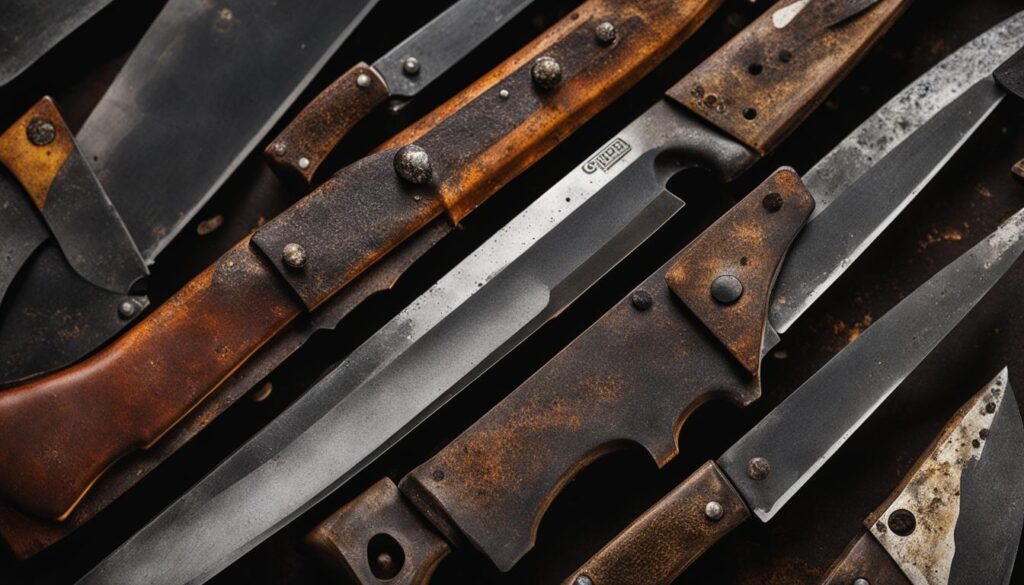
The Importance of Consistency in Preventing Rust on Steel Blades
Consistency is crucial when it comes to preventing rust on steel blades. By incorporating good habits into your daily routine, you can ensure that your hunting knife remains rust-free and ready for use at all times.
One important habit is to regularly apply oil to the joints and springs of a pocket knife and wipe the blade with an oil-moistened cloth. This will help reduce friction, improve performance, and prevent rust. Especially if you live in a hot or damp climate or near the ocean, paying extra attention to rust prevention measures is essential.
Cleaning your knife thoroughly is also vital in rust prevention. Remember to clean not only the blade but also the handle, locking mechanisms, and pivot points, if applicable. Keeping these areas free from dirt and moisture will significantly reduce the risk of rust formation.
Consistency in maintenance routines is key to keeping your steel blades rust-free. By adopting these habits as part of your regular knife care, you can prolong the lifespan of your hunting knife and ensure optimal performance for years to come.
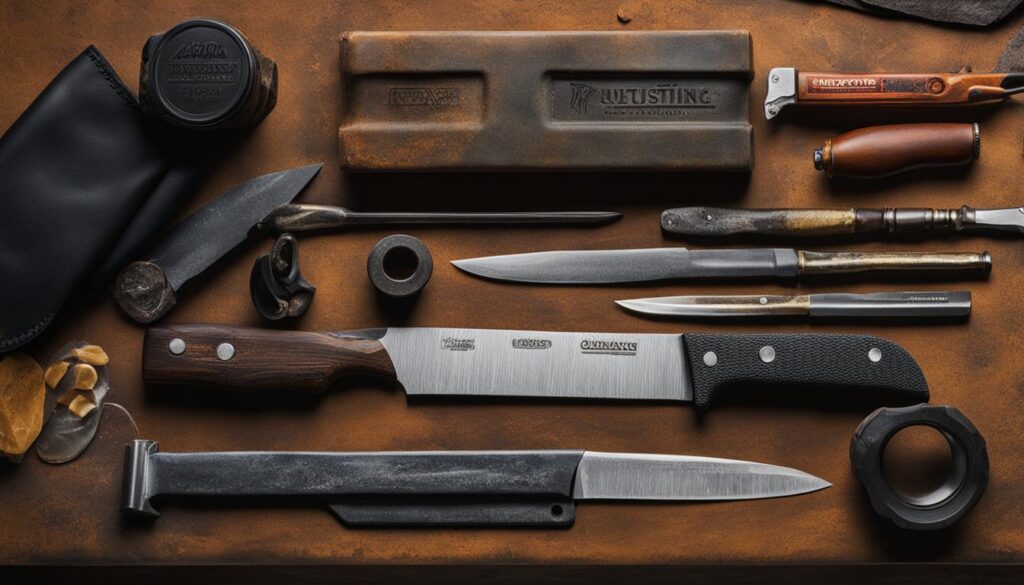

| Rust Prevention Routine | Description |
|---|---|
| Cleaning | Thoroughly clean the blade, handle, locking mechanisms, and pivot points to remove dirt and moisture. |
| Oil Application | Regularly apply oil to the joints, springs, and blade to reduce friction and prevent rust. |
| Environmental Control | Store the knife in a cool and dry place away from humidity and corrosive substances. |
| Regular Inspection | Check the knife for any signs of rust or damage and address them promptly. |
| Professional Maintenance | Seek professional knife maintenance services from a local bladesmith for proper care and restoration when needed. |
By following these maintenance routines consistently, you can keep your hunting knives in excellent condition and enjoy their sharpness and reliability for years to come.
Conclusion
In conclusion, maintaining a rust-free hunting knife is crucial for optimal performance and longevity. By following these essential rust prevention tips, you can ensure that your knives remain in excellent condition and rust-free.
Proper cleaning is the first step in preventing rust on your hunting knife. Be sure to wash the blade thoroughly with soapy water after each use and dry it completely before storing it. Additionally, remember to clean the handle, locking mechanisms, and pivot points, if applicable, to prevent dirt and substances from causing rust over time.
Applying a layer of protective wax or oil to the blade is another effective rust prevention measure. Products like MKC blade wax, made with natural materials, can provide an extra layer of protection against moisture and air. Regularly reapplying the wax after each cleaning is essential to maintain its effectiveness.
Lastly, proper storage is key to preventing rust on your hunting knives. Keep them in a cool and dry place away from humidity, and avoid storing them in a sheath for extended periods. Wrapping the knife in acid-free paper and placing it in a plastic bag can provide additional protection against moisture and mold.
By consistently incorporating these rust prevention tips into your hunting knife maintenance routine, you can enjoy rust-free knives that are always ready for use. Remember, prevention is easier than dealing with rust and corrosion, so take the necessary steps to keep your hunting knives in excellent condition.
FAQ
How does steel rust?
Steel rusts when iron in the steel reacts with oxygen and water, forming a reddish-brown buildup called rust.
How does the Montana Knife Company prevent rust on their knives?
Montana Knife Company uses Parkerizing, a phosphate coating process, to protect their carbon steel blades from rust. They also use Cerakote, a durable ceramic finish.
What can I do to prevent rust on my hunting knife?
To prevent rust, clean the blade thoroughly with soapy water after each use, apply a layer of blade wax, and keep the sheath dry.
How often should I lubricate my hunting knife?
It is recommended to lubricate your hunting knife regularly. Apply a few drops of oil to the joints and springs of a pocket knife, and wipe the blade with an oil-moistened cloth for other blades.
What should I do if my knife comes into contact with saltwater?
If your blade comes into contact with saltwater or other corrosive substances, rinse it thoroughly with tap water, dry it well, and apply a light coat of oil.
How should I store my hunting knife to prevent rust?
Store your knife in a cool and dry place away from humidity. Avoid storing it in a sheath for extended periods, as leather sheaths can collect moisture. Wrapping the knife in acid-free paper and placing it in a plastic bag can further safeguard it from moisture and mold.
What are some common mistakes to avoid for rust prevention?
Avoid using your knife to skin wood or cut branches, as these actions can damage the steel. Also, avoid neglecting to clean the knife after each use and storing it in a damp sheath.
How important is consistency in preventing rust on steel blades?
Consistency is key in rust prevention. Incorporate good habits into your daily routine, such as applying oil regularly and cleaning the knife thoroughly after each use.
